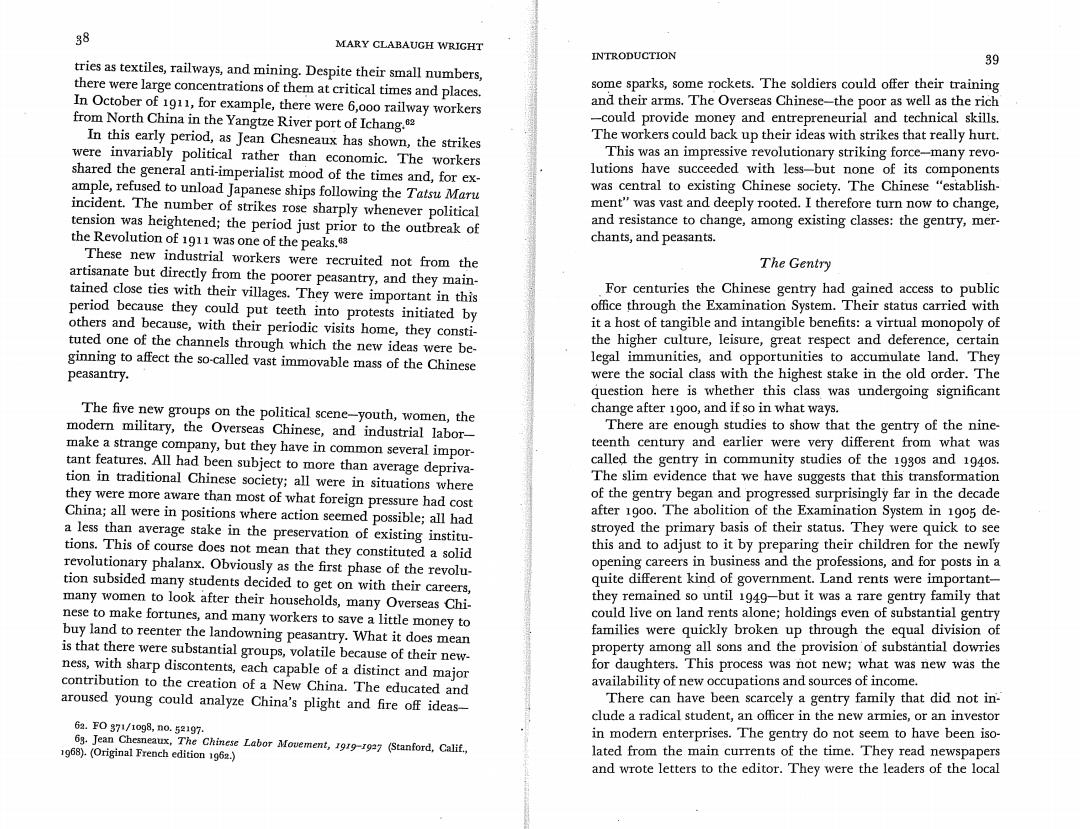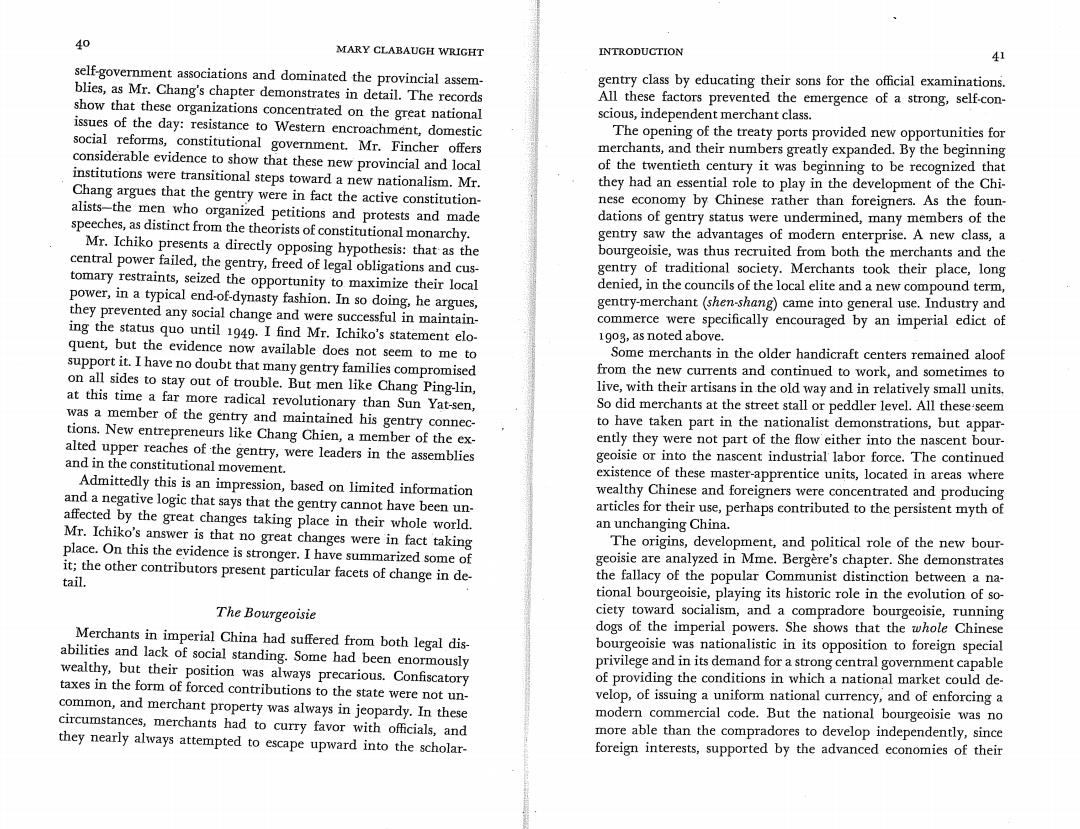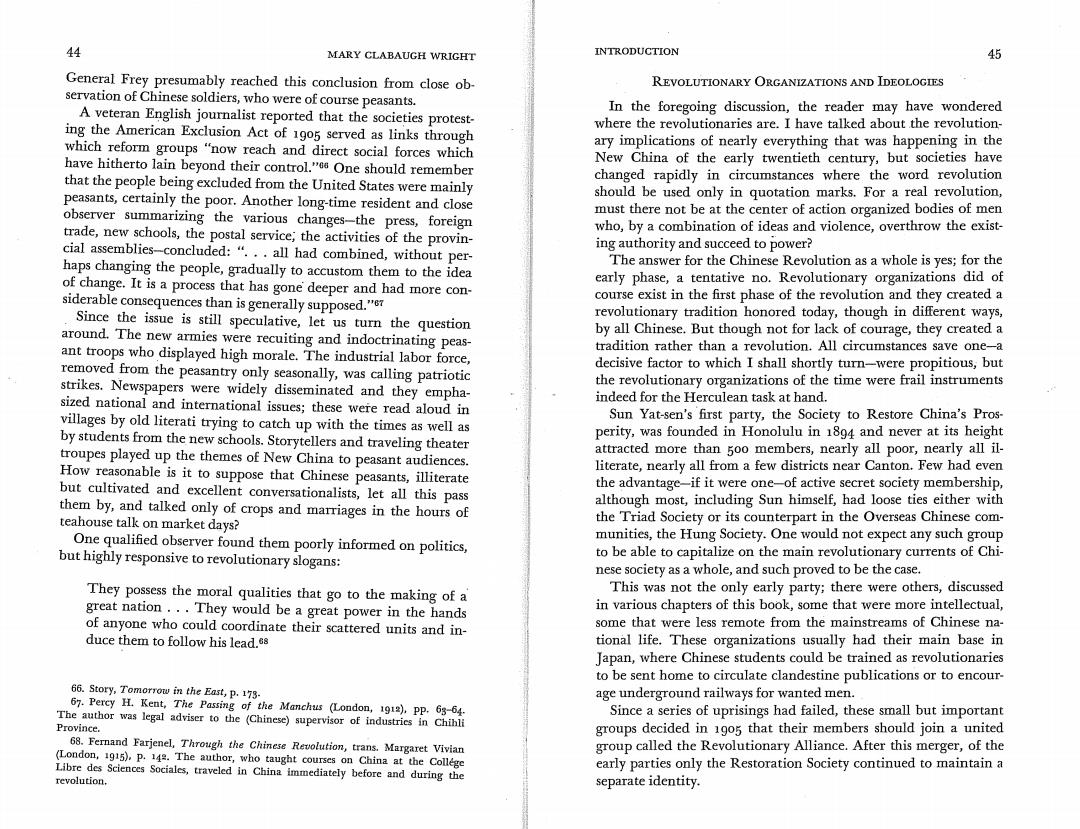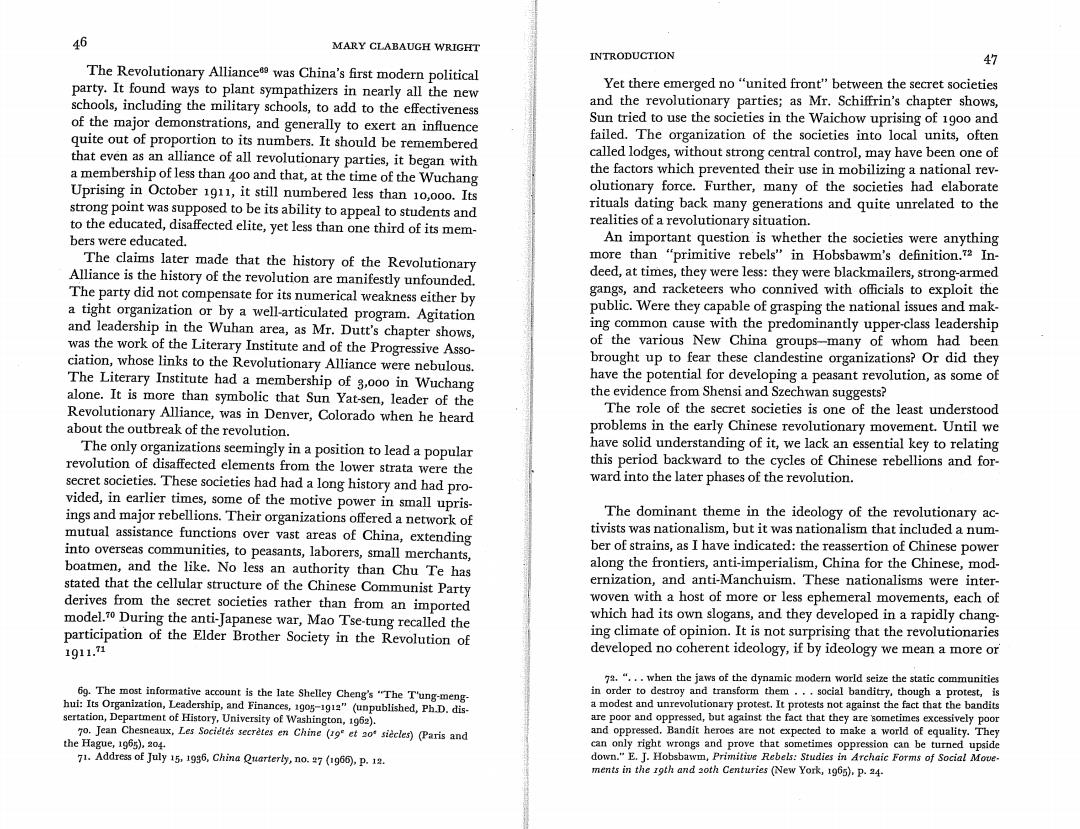
88 MARY CLABAUGH WRIGHT INTRODUCTION tries as textiles,railways,and mining.Despite their small numbers, 39 there were large concentrations of them at critical times and places. some sparks,some rockets.The soldiers could offer their training In October of 1911,for example,there were 6,o00 railway workers and their arms.The Overseas Chinese-the poor as well as the rich from North China in the Yangtze River port of Ichang.02 -could provide money and entrepreneurial and technical skills. In this early period,as Jean Chesneaux has shown,the strikes The workers could back up their ideas with strikes that really hurt. were invariably political rather than economic.The workers This was an impressive revolutionary striking force-many revo- shared the general anti-imperialist mood of the times and,for ex- lutions have succeeded with less-but none of its components ample,refused to unload Japanese ships following the Tatsu Maru was central to existing Chinese society.The Chinese "establish- incident.The number of strikes rose sharply whenever political ment"was vast and deeply rooted.I therefore turn now to change, tension was heightened;the period just prior to the outbreak of and resistance to change,among existing classes:the gentry,mer- the Revolution of 1911 was one of the peaks.3 chants,and peasants. These new industrial workers were recruited not from the artisanate but directly from the poorer peasantry,and they main- The Gentry tained close ties with their villages.They were important in this For centuries the Chinese gentry had gained access to public period because they could put teeth into protests initiated by office through the Examination System.Their status carried with others and because,with their periodic visits home,they consti- it a host of tangible and intangible benefits:a virtual monopoly of tuted one of the channels through which the new ideas were be- the higher culture,leisure,great respect and deference,certain ginning to affect the so-called vast immovable mass of the Chinese legal immunities,and opportunities to accumulate land.They peasantry. were the social class with the highest stake in the old order.The question here is whether this class was undergoing significant The five new groups on the political scene-youth,women,the change after 1goo,and if so in what ways. modern military,the Overseas Chinese,and industrial labor- There are enough studies to show that the gentry of the nine- make a strange company,but they have in common several impor- teenth century and earlier were very different from what was tant features.All had been subject to more than average depriva- called the gentry in community studies of the 19sos and 1940s. tion in traditional Chinese society;all were in situations where The slim evidence that we have suggests that this transformation they were more aware than most of what foreign pressure had cost of the gentry began and progressed surprisingly far in the decade China;all were in positions where action seemed possible;all had after 1goo.The abolition of the Examination System in 1905 de- a less than average stake in the preservation of existing institu- stroyed the primary basis of their status.They were quick to see tions.This of course does not mean that they constituted a solid this and to adjust to it by preparing their children for the newly revolutionary phalanx.Obviously as the first phase of the revolu- opening careers in business and the professions,and for posts in a tion subsided many students decided to get on with their careers, quite different kind of government.Land rents were important- many women to look after their households,many Overseas Chi- they remained so until 1949-but it was a rare gentry family that nese to make fortunes,and many workers to save a little money to could live on land rents alone;holdings even of substantial gentry buy land to reenter the landowning peasantry.What it does mean families were quickly broken up through the equal division of is that there were substantial groups,volatile because of their new- property among all sons and the provision of substantial dowries ness,with sharp discontents,each capable of a distinct and major for daughters.This process was not new;what was new was the contribution to the creation of a New China.The educated and availability of new occupations and sources of income. aroused young could analyze China's plight and fire off ideas- There can have been scarcely a gentry family that did not in- clude a radical student,an officer in the new armies,or an investor 62.F0371/1098,n0.52197. 6g.Jean Chesneaux,The Chinese Labor Movement,1919-1927(Stanford,Calif., in modern enterprises.The gentry do not seem to have been iso- 1968).(Original French edition 1962.) lated from the main currents of the time.They read newspapers and wrote letters to the editor.They were the leaders of the local

% MARY CLABAUGH WRIGHT INTRODUCTION 41 self-government associations and dominated the provincial assem- blies,as Mr.Chang's chapter demonstrates in detail.The records gentry class by educating their sons for the official examinations. show that these organizations concentrated on the great national All these factors prevented the emergence of a strong,self-con- scious,independent merchant class. issues of the day:resistance to Western encroachment,domestic social reforms,constitutional government.Mr.Fincher offers The opening of the treaty ports provided new opportunities for considerable evidence to show that these new provincial and local merchants,and their numbers greatly expanded.By the beginning institutions were transitional steps toward a new nationalism.Mr. of the twentieth century it was beginning to be recognized that Chang argues that the gentry were in fact the active constitution- they had an essential role to play in the development of the Chi- alists-the men who organized petitions and protests and made nese economy by Chinese rather than foreigners.As the foun- speeches,as distinct from the theorists of constitutional monarchy. dations of gentry status were undermined,many members of the Mr.Ichiko presents a directly opposing hypothesis:that as the gentry saw the advantages of modern enterprise.A new class,a central power failed,the gentry,freed of legal obligations and cus- bourgeoisie,was thus recruited from both the merchants and the tomary restraints,seized the opportunity to maximize their local gentry of traditional society.Merchants took their place,long power,in a typical end-of-dynasty fashion.In so doing,he argues, denied,in the councils of the local elite and a new compound term, they prevented any social change and were successful in maintain- gentry-merchant(shen-shang)came into general use.Industry and ing the status quo until 1949.I find Mr.Ichiko's statement elo- commerce were specifically encouraged by an imperial edict of quent,but the evidence now available does not seem to me to 1903,as noted above. support it.I have no doubt that many gentry families compromised Some merchants in the older handicraft centers remained aloof on all sides to stay out of trouble.But men like Chang Ping-lin, from the new currents and continued to work,and sometimes to at this time a far more radical revolutionary than Sun Yat-sen, live,with their artisans in the old way and in relatively small units. was a member of the gentry and maintained his gentry connec- So did merchants at the street stall or peddler level.All these seem tions.New entrepreneurs like Chang Chien,a member of the ex- to have taken part in the nationalist demonstrations,but appar- alted upper reaches of the gentry,were leaders in the assemblies ently they were not part of the flow either into the nascent bour- and in the constitutional movement. geoisie or into the nascent industrial labor force.The continued Admittedly this is an impression,based on limited information existence of these master-apprentice units,located in areas where and a negative logic that says that the gentry cannot have been un- wealthy Chinese and foreigners were concentrated and producing affected by the great changes taking place in their whole world. articles for their use,perhaps contributed to the persistent myth of Mr.Ichiko's answer is that no great changes were in fact taking an unchanging China. place.On this the evidence is stronger.I have summarized some of The origins,development,and political role of the new bour- it;the other contributors present particular facets of change in de- geoisie are analyzed in Mme.Bergere's chapter.She demonstrates tail. the fallacy of the popular Communist distinction between a na- tional bourgeoisie,playing its historic role in the evolution of so- The Bourgeoisie ciety toward socialism,and a compradore bourgeoisie,running Merchants in imperial China had suffered from both legal dis- dogs of the imperial powers.She shows that the whole Chinese abilities and lack of social standing.Some had been enormously bourgeoisie was nationalistic in its opposition to foreign special wealthy,but their position was always precarious.Confiscatory privilege and in its demand for a strong central government capable taxes in the form of forced contributions to the state were not un- of providing the conditions in which a national market could de- common,and merchant property was always in jeopardy.In these velop,of issuing a uniform national currency,and of enforcing a circumstances,merchants had to curry favor with officials,and modern commercial code.But the national bourgeoisie was no they nearly always attempted to escape upward into the scholar- more able than the compradores to develop independently,since foreign interests,supported by the advanced economies of their

42 MARY CLABAUGH WRIGHT INTRODUCTION home countries and protected by treaty from Chinese law and 43 from all but nominal taxation,dominated the entire modern sec- for revolution if the revolutionary leaders had only understood tor of the Chinese economy. how to reach them? Nonetheless,when it came the revolution was distinctly not a Here I think we must recognize the illogical but real distinction bourgeois revolution;the bourgeoisie's role was important but between the "people of China"and the peasantry who constituted always auxiliary.They were,along with the gentry,leaders in the 8o percent of that people.It is clear that the British minister was constitutional movement and in the formation of a new public greatly in error when he reported that the revolution was based on opinion.When fighting broke out,they sometimes gave the revo- "the usual platitudes about the struggle for freedom...in which lutionaries active support without thought of property loss-local not more than five percent of the population of China take the variations were enormous on this point-but generally they at- slightest interest."The Foreign Office found this"remarkable"in tempted to work out an orderly transfer of power;for long periods view of the information coming in,but noted that even so,5 per- their chambers of commerce were often the only stable source of cent of the population of China was 20,000,000 people. authority. It is abundantly clear that considerably more than 5 percent of There is a strange discrepancy between the interests and role the population was involved in the massive boycotts and demon- of the bourgeoisie and its ideology.Its members talked vaguely but strations to which I have referred above.The people of China were passionately of liberty,equality,and fraternity;of nationalism, certainly affected by and contributing to these changes,if by peo- democracy,and mass welfare.These ideas were neither coherently ple one means the visible 2o percent.One need only recall,as thought out nor expressive of their class interests,for theirs was noted above,that the proportion of the electorate expanded from1 in no way the position of the French bourgeoisie in the eighteenth percent of the adult male population in 1g09 to 25 percent in 1913; century.Yet the very fact that these words,however poorly under- or that the signatures to the petitions demanding a speedier con- stood,were so constantly used,may have been one of the most im- vening of a parliament expanded from a reported 200,o0o signa- portant contributions of the bourgeoisie to the revolutionary tures in June 1g10 to a reported 25 million in October of that movement. year.In my opinion,on the evidence now available,these changes In this first stage of the revolution,the bourgeoisie-even the were also reaching into the peasantry. Cantonese bourgeoisie-did not show the regional particularism The fallacy of an inert peasantry that characterized so many con- and resistance that characterized its attitude in the second phase temporary accounts and continues,in my view,to distort research, of the revolution in the 1ggos.Had Yuan Shih-k'ai's political neu- was well expressed by a careful observer who was,surprisingly, tralization of the bourgeoisie in 1913 proved permanently effec- General Frey of the French colonial army.In his opinion,there tive?Had businessmen come to understand the implications of was ample evidence of the nationalism of the Chinese peasant: what they had been saying and been frightened?Or did the Chi- that he was concerned with the fate of the country as a whole at the nese Revolution pass them by as it sped in two generations from a hands of foreigners and with the problems of remote areas within traditional society that gave the bourgeoisie little scope to a social- China.Frey attributed widespread European belief in the self- ist society that gave them none? centeredness of a self-sufficient peasantry to the fact that many of The Peasantry the writers had little knowledge of the Chinese countryside and were prone to generalize on the basis of their acquaintance with To what degree did the revolutionary changes of the early twen- what he called the mercenary uprooted Chinese of the coastal tieth century affect the peasantry?Were the peasants,as some have cities.He pointed out that peasants must work without interrup- claimed,largely ignorant of what was going on in the upper layers tion or starve.e5 The fact that they continued to work in the of society,a passive mass that was indifferent unless one or another fields did not prove that their interests were limited to those fields. of the contesting parties pressed them too hard in the demand for grain and manpower?Or were they ready to provide a mass base 64.FO 371/15,no.952.The Foreign Office cover minute was marked for the attention of the cabinet. 65.General H.Frey,L'Armee chinoise (Paris,04)pp.85-95

44 MARY CLABAUGH WRIGHT INTRODUCTION 45 General Frey presumably reached this conclusion from close ob- REVOLUTIONARY ORGANIZATIONS AND IDEOLOGIES servation of Chinese soldiers,who were of course peasants. A veteran English journalist reported that the societies protest- In the foregoing discussion,the reader may have wondered ing the American Exclusion Act of 1905 served as links through where the revolutionaries are.I have talked about the revolution- which reform groups "now reach and direct social forces which ary implications of nearly everything that was happening in the have hitherto lain beyond their control."06 One should remember New China of the early twentieth century,but societies have that the people being excluded from the United States were mainly changed rapidly in circumstances where the word revolution peasants,certainly the poor.Another long-time resident and close should be used only in quotation marks.For a real revolution, observer summarizing the various changes-the press,foreign must there not be at the center of action organized bodies of men trade,new schools,the postal service;the activities of the provin- who,by a combination of ideas and violence,overthrow the exist- cial assemblies-concluded:"...all had combined,without per- ing authority and succeed to power? haps changing the people,gradually to accustom them to the idea The answer for the Chinese Revolution as a whole is yes;for the of change.It is a process that has gone deeper and had more con- early phase,a tentative no.Revolutionary organizations did of siderable consequences than is generally supposed." course exist in the first phase of the revolution and they created a Since the issue is still speculative,let us turn the question revolutionary tradition honored today,though in different ways, around.The new armies were recuiting and indoctrinating peas- by all Chinese.But though not for lack of courage,they created a ant troops who displayed high morale.The industrial labor force, tradition rather than a revolution.All circumstances save one-a removed from the peasantry only seasonally,was calling patriotic decisive factor to which I shall shortly turn-were propitious,but strikes.Newspapers were widely disseminated and they empha- the revolutionary organizations of the time were frail instruments sized national and international issues;these were read aloud in indeed for the Herculean task at hand. villages by old literati trying to catch up with the times as well as Sun Yat-sen's first party,the Society to Restore China's Pros- by students from the new schools.Storytellers and traveling theater perity,was founded in Honolulu in 1894 and never at its height troupes played up the themes of New China to peasant audiences. attracted more than 500 members,nearly all poor,nearly all il- How reasonable is it to suppose that Chinese peasants,illiterate literate,nearly all from a few districts near Canton.Few had even but cultivated and excellent conversationalists,let all this pass the advantage-if it were one-of active secret society membership, them by,and talked only of crops and marriages in the hours of although most,including Sun himself,had loose ties either with teahouse talk on market days? the Triad Society or its counterpart in the Overseas Chinese com- One qualified observer found them poorly informed on politics, munities,the Hung Society.One would not expect any such group but highly responsive to revolutionary slogans: to be able to capitalize on the main revolutionary currents of Chi- nese society as a whole,and such proved to be the case. They possess the moral qualities that go to the making of a This was not the only early party;there were others,discussed great nation...They would be a great power in the hands in various chapters of this book,some that were more intellectual, of anyone who could coordinate their scattered units and in- some that were less remote from the mainstreams of Chinese na- duce them to follow his lead.68 tional life.These organizations usually had their main base in Japan,where Chinese students could be trained as revolutionaries to be sent home to circulate clandestine publications or to encour- 66.Story,Tomorrow in the East,p.173. age underground railways for wanted men. 67.Percy H.Kent,The Passing of the Manchus (London,1912).Pp.63-64. The author was legal adviser to the (Chinese)supervisor of industrics in Chihli Since a series of uprisings had failed,these small but important Province. groups decided in 1905 that their members should join a united 68.Fernand Farjenel,Through the Chinese Revolution,trans.Margaret Vivian (London,1915),p.142.The author,who taught courses on China at the College group called the Revolutionary Alliance.After this merger,of the Libre des Sciences Sociales,traveled in China immediately before and during the early parties only the Restoration Society continued to maintain a revolution. separate identity

46 MARY CLABAUGH WRIGHT INTRODUCTION 47 The Revolutionary Alliance9 was China's first modern political party.It found ways to plant sympathizers in nearly all the new Yet there emerged no"united front"between the secret societies schools,including the military schools,to add to the effectiveness and the revolutionary parties;as Mr.Schiffrin's chapter shows, of the major demonstrations,and generally to exert an influence Sun tried to use the societies in the Waichow uprising of 1go0 and quite out of proportion to its numbers.It should be remembered failed.The organization of the societies into local units,often that even as an alliance of all revolutionary parties,it began with called lodges,without strong central control,may have been one of a membership of less than 400 and that,at the time of the Wuchang the factors which prevented their use in mobilizing a national rev- Uprising in October 1911,it still numbered less than 10,000.Its olutionary force.Further,many of the societies had elaborate strong point was supposed to be its ability to appeal to students and rituals dating back many generations and quite unrelated to the to the educated,disaffected elite,yet less than one third of its mem- realities of a revolutionary situation. bers were educated. An important question is whether the societies were anything The claims later made that the history of the Revolutionary more than "primitive rebels"in Hobsbawm's definition.72 In- Alliance is the history of the revolution are manifestly unfounded. deed,at times,they were less:they were blackmailers,strong-armed The party did not compensate for its numerical weakness either by gangs,and racketeers who connived with officials to exploit the a tight organization or by a well-articulated program.Agitation public.Were they capable of grasping the national issues and mak- and leadership in the Wuhan area,as Mr.Dutt's chapter shows, ing common cause with the predominantly upper-class leadership was the work of the Literary Institute and of the Progressive Asso- of the various New China groups-many of whom had been ciation,whose links to the Revolutionary Alliance were nebulous. brought up to fear these clandestine organizations?Or did they The Literary Institute had a membership of 3,o0o in Wuchang have the potential for developing a peasant revolution,as some of alone.It is more than symbolic that Sun Yat-sen,leader of the the evidence from Shensi and Szechwan suggests? Revolutionary Alliance,was in Denver,Colorado when he heard The role of the secret societies is one of the least understood about the outbreak of the revolution. problems in the early Chinese revolutionary movement.Until we The only organizations seemingly in a position to lead a popular have solid understanding of it,we lack an essential key to relating revolution of disaffected elements from the lower strata were the this period backward to the cycles of Chinese rebellions and for- secret societies.These societies had had a long history and had pro- ward into the later phases of the revolution. vided,in earlier times,some of the motive power in small upris- ings and major rebellions.Their organizations offered a network of The dominant theme in the ideology of the revolutionary ac- mutual assistance functions over vast areas of China,extending tivists was nationalism,but it was nationalism that included a num- into overseas communities,to peasants,laborers,small merchants, ber of strains,as I have indicated:the reassertion of Chinese power boatmen,and the like.No less an authority than Chu Te has along the frontiers,anti-imperialism,China for the Chinese,mod. stated that the cellular structure of the Chinese Communist Party ernization,and anti-Manchuism.These nationalisms were inter- derives from the secret societies rather than from an imported woven with a host of more or less ephemeral movements,each of model.70 During the anti-Japanese war,Mao Tse-tung recalled the which had its own slogans,and they developed in a rapidly chang- participation of the Elder Brother Society in the Revolution of ing climate of opinion.It is not surprising that the revolutionaries 1911.71 developed no coherent ideology,if by ideology we mean a more or 78."..when the jaws of the dynamic modern world seize the static communities 69.The most informative account is the late Shelley Cheng's"The T'ung-meng- in order to destroy and transform them...social banditry.though a protest,is hui:Its Organization,Leadership,and Finances,1go5-1913"(unpublished,Ph.D.dis- a modest and unrevolutionary protest.It protests not against the fact that the bandits sertation,Department of History,University of Washington,1g62). are poor and oppressed,but against the fact that they are sometimes excessively poor 7o.Jean Chesneaux,Les Socidtes secretes en Chine (1 et ao siecles)(Paris and and oppressed.Bandit heroes are not expected to make a world of equality.They the Hague,1965),204. can only right wrongs and prove that sometimes oppression can be turned upside 71.Address of July 15,1936,China Quarterly,no.7(166),p.12. down."E.J.Hobsbawm,Primitive Rebels:Studies in Archaic Forms of Social Move- ments in the roth and aoth Centuries (New York,1965),p.24